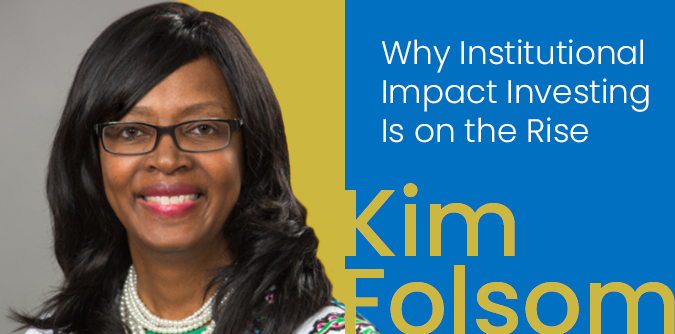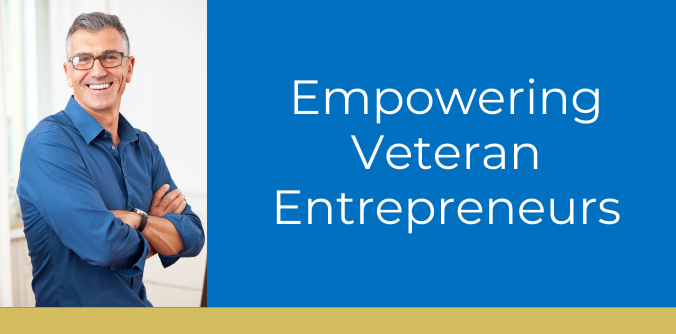Why Institutional Impact Investing is on the Rise
By:
Kim Folsom
I was recently invited to speak at the Venture Capital and Private Equity conference hosted by Harvard University. It was an amazing event focused on innovative finance. I had a seat at the table with people who managed portfolios worth multi-billions of dollars. I had the chance to talk about inequity in financing and was heartened to hear how the other investors around me approached social impact investing.
There are many issues that contribute to finance inequity. When people look at the actual amount of capital that’s available, they can see the lack of capital that goes to businesses led by women and people of color. And this isn’t a new phenomenon. This has been going on for hundreds of years. So, this poses the question: Is there only a set pie to draw from—you either get it or you don’t? Well, prior to the George Floyd/Black Lives Matter movement, there was about 1% of capital that went to businesses led by black and brown founders and 5% went to businesses led by women. Since then, it’s doubled.
So that’s good news. But it’s not a reason to celebrate. Going from 1% to 2% is not that much. The fact is, women and people of color are starting businesses at three times the rate of businesses led by the standard group, but they are still way, way, way underfunded.
Something has to be done about this. For the past couple of decades where this has been measured, these businesses haven’t received sufficient capital, which means that they don’t grow, there’s no job creation, and there’s no wealth creation associated with them. And the big piece about this, which affects everyone? The majority of our job creation happens from small businesses. In fact, 35% of all jobs are created by small businesses. They’re the biggest employers in our country. They employ much more than large and medium-size businesses.
Several different capital sources were represented on the panel I participated on at the conference. Someone spoke about equity, with more of a tech focus. I talked about mainstream companies. Somebody else spoke from the point of view of CDFIs (Community Development Financial Institutions), which are more of a government sanctioned funding source. And they had someone from a bank and someone from philanthropies, too. I had a chance to talk about our growth program and the revenue-based financing model we practice at Founders First Capital Partners. But what couldn’t escape me was the forum we were talking in. Harvard produces three times the number of billionaires than any other graduate school. Their alumni and their network are a cornerstone of the economy. The people they had that came to speak were at the upper echelon of finance in America. They had two guys that ran the most successful private equity firms—one was Silver Lake and the other was Blackstone. The head of CalPERS, the largest institutional investment organization in the U.S., was the final keynote speaker. To be sandwiched in with all of those folks and sharing their perspective on things was pretty significant.
Harvard has this private equity club in which half their business students are members. They are able to have these amazing speakers that have such a significant impact on us. There’s still this perception that it’s just the regular market that counts, that there’s not yet an appreciation for impact investing, social economic investing. But that’s not really true. Yes, there’s still an opportunity to educate people, to help them understand that impact investing isn’t just a philanthropic thing, that it is a good thing for the U.S. economy overall. And if it’s done the right way, it will grow our overall GDP. But many of the people I talked with at this conference clearly got that.
The biggest institutional investor at the conference shared that social-economic initiatives are not going to go away because today women have a bigger role in our economy than ever before. And by 2030, the collective populations of people of color will be the majority. It’s not a fad. It’s something much more permanent and growing. The fact that there’s institutional investors like CalPERS and Blackstone driving an ESG (environmental, social, and governance), social-economic initiative mandate will hopefully make the whole idea of impact investing and the things we do at Founders First much more mainstream sooner rather than later.
We’re not there yet. A lot of people still think socio-economic investing is purely philanthropic. But those folks aren’t looking at the return on investment. The many diverse fund managers we have now will help. And so will the institutional investors who were part of this conference who say this is really important and they’re holding the people they invest in to higher standards. It’s going to have an impact, especially when you consider that they are investing something like $500 billion. They have a lot of influence.
Hearing from all these speakers, and working with them for the day, was really fantastic. It just showed how relevant our mission is here at Founders First. I was proud to participate. Most of all it showed that institutional impact investing is on the rise and here to stay.
Kim Folsom is the founder and CEO of Founders First Capital Partners, which has helped accelerate the success of hundreds of small, diverse-led companies since 2015. Visit our website to learn more.




